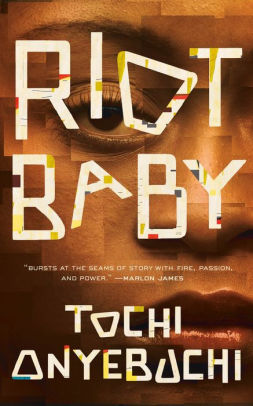
Riot Baby, Tochi Onyebuchi
This is an intense, passionate, and angry book, practically pulsing with the wrongness of the world.
It centers around the life and experience of two siblings. When we begin, Ella is a young child growing up in Compton, being raised by a single mother, whose baby brother, Kev, is born the day of the Rodney King riots. The book takes us through the swirl of that day from Ella’s perspective, the anger and fear and feeling of helplessness that pervades the community. From there we jump to Harlem, and see Kev and Ella both in school, and their mother working as a nurse in a hospital. The kids have to navigate the dangers of the neighborhood, whether gangs and bullies or, far more dangerous, cops constantly arresting or hassling young boys. Eventually Kev ends up in Rikers, where we see his perspective trying to survive in prison.
And through all of this Ella has a Thing, starting from when she is young. She’ll get nosebleeds, get seizures and see the future—from what will happen that afternoon, to the life of someone’s baby—visions that she can’t control. By the time we’re in Harlem her powers have grown so that she can control the weather and create snow inside the apartment, and manipulate the world around her to a certain extent. After letting her anger grow and get out of control to the point she almost ends up killing her mother, she disappears. We eventually learn that she has spent this time training herself and growing to immense power, all the while feeling and living the pain and anger and injustice racism inflicts on her family and other black people in America. Her Thing has expanded and she can both in control the world around her and project herself in the world around. Eventually she can visit Kev this way and take him with her to show him visions, and give him something outside of the prison.
The book doesn’t have much of a clear story or plot so much as a series of scenes for Ella or for Kev, short scenes that jump around and leave it to the reader to connect he plot and the timeline, but the story it tells of race and blackness in America is clear and easy to follow. It can be a bit hard to get a handle on the timeline in the book, as it seems to have recent murders and examples of police brutality discussed at times that don’t’ seem to go together with other events. But I would also say that the jumbling up of time, and the running together of the atrocities is likely intentional. After all, the same event seems to happen again. And again. And again. How can we separate the times?
Riot Baby eventually moves into the near future, with private prisons giving way to privately run parole villages with constant surveillance and control, straight out of Foucault’s nightmares. In the outside world surveillance technology and algorithms designed to eliminate discrimination and police brutality have only further bureaucratized and legitimized it; after all, how can you argue with the computer program? I do not want to discuss the ending too much, so I will only say that the end isn’t so much hopeful or promising or depressing or dystopian or even a call to action as it is cathartic. It was unlike many of the other books grappling with racism out there, and for that reason alone a good choice to add more perspectives.
Filed under: Book Reviews, books, dystopia, fantasy, race, raci, science fiction | Tagged: 2020, dystopia, racism, riot baby, science fiction, tochi onyebuchi | 2 Comments »

